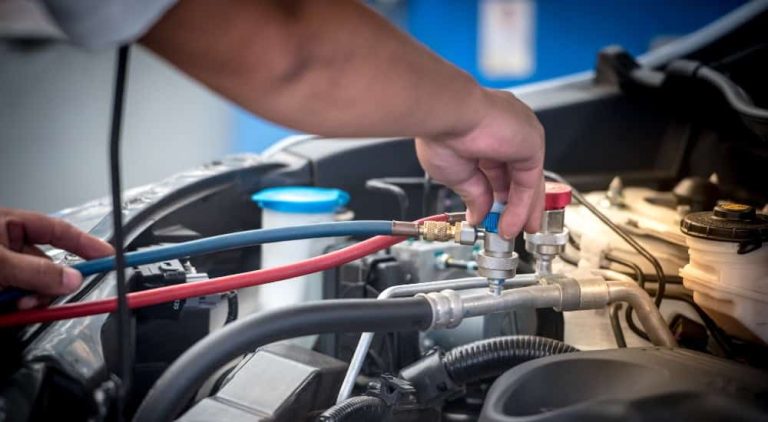Your air conditioner is one of the most important aspects of your home. For this reason, it’s best to assess and inspect its performance regularly. Regular inspection is considered the king of preventive maintenance as it helps you detect issues such as refrigerant leaks early before they escalate.
Your AC’s refrigerant system is constantly under high pressure, meaning its components can degrade over time, causing leaks. While refrigerant leaks may seem unproblematic, inhaling the coolant can cause respiratory issues. Direct exposure can also cause burns, skin irritation, dizziness, or seizures. Also, refrigerant leaks cause your AC to strain producing adequate air, preventing your home from reaching the desired temperature. As a result, it’s essential to schedule annual tune-ups from ac repair near me.
In this post, we’ll look at signs of AC refrigerant leaks and their solutions. Read on to find out more!
AC Not Blowing Cold Air
If you realize your AC is blowing warm air out of the vents, double-check all the components. Your AC may often blow hot air because of dirty air filters, thermostat setting errors, ductwork issues, or an ageing HVAC system. If you rectify all these issues but still experience the problem, then your AC may have a refrigerant leak. A refrigerant helps absorb heat from the air, allowing it to cool and circulate throughout your home. When there’s a leak, your AC won’t have enough refrigerant to cool the air, causing warm air to flow into your home.
If you suspect a refrigerant leak, it’s best to call ac repair near me Stillwater, OK, or another company near you, to inspect and fix the issue. Trying to resolve the issue yourself may lead to more harm than good. The experts will fix the problem and top the coolant to its desired level.
Frozen Coils
Frozen coils can be a sign of a refrigerant leak but can also be caused by blocked airflow and clogged air filters. However, refrigerant leaks could be the issue if you’ve ruled out the other causes. When there’s a leak, the pressure and temperature of your AC system and the coolant drop, causing the evaporator coil to freeze. An evaporator coil helps absorb heat from the air and transfer it to the refrigerant to allow the air to cool down.
To fix the frozen coils, turn off the AC to allow the coil to thaw and prevent further damage to the unit. Then locate the leak and call-in professionals to repair it. Avoid fixing it yourself, as you don’t have the specialized equipment and safety gear. As stated, refrigerant can be dangerous if not handled with care.
Hissing Sounds
Hearing hissing sounds in your AC system can signify a refrigerant leak. When your coils become cracked or have holes, the refrigerant may start leaking through the holes. It causes hissing sounds as the refrigerant escapes through the damaged parts. A larger leak produces gurgling sounds.
To fix the issue, turn off the AC and try locating the holes using a leak detector. After finding the leaks, have the damaged sections repaired or replaced. The leaks often occur in the refrigerant lines or the evaporator coil. After fixing the leaks, recharge the refrigerant to ensure your AC functions properly.
Heightened Energy Bills
Higher energy bills can also be a sign of a refrigerant leak. When your AC has insufficient refrigerant, it forces your unit to strain to cool your home. The AC will have to run long cycles to achieve the right temperature. It can lead to high energy consumption, leading to increased energy bills. Therefore, if you notice your energy bills are rising beyond normal, and you aren’t overusing the AC, your unit could have a refrigerant leak.
Addressing the leak and refilling the refrigerant can restore your system’s efficiency and lower energy bills. Here’s a video on some other ways to save money while keeping cool during the summer months.
High Indoor Humidity
AC unit stabilizes temperatures in your home and lowers humidity levels. It helps reduce the issues caused by high humidity, such as discomfort and mold growth. When refrigerant leaks, your unit can’t reduce humidity levels. Refrigerant helps absorb heat and moisture from the air, and if there’s a leak, it may not be enough to dehumidify your home. For this reason, humidity levels elevate. You can notice this if you see condensation on your windows, your home starts to feel sticky, or you notice a moldy smell. Call a plumber to help locate and fix the leaks to rectify this. Otherwise, you’ll experience mold growth that will be challenging to remediate.
Conclusion
There you go! Those are some signs to tell that your AC has a refrigerant leak. By identifying leaks, you help prevent further damage to your unit and ensure your safety. Suppose you suspect a refrigerant leak, turn off the AC and call in the experts. Only try fixing the issue if you have the knowledge and skills. Otherwise, you can cause more harm to your AC, leading to expensive repairs. Also, refrigerants are hazardous and cause irritation, burns, and respiratory issues.

